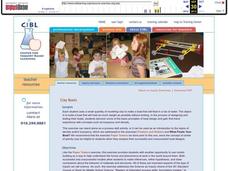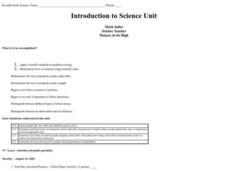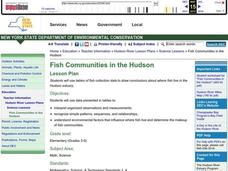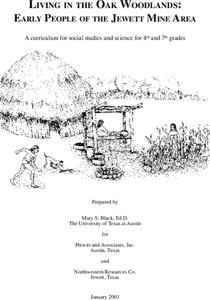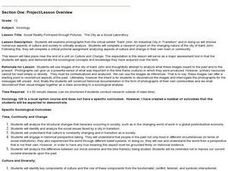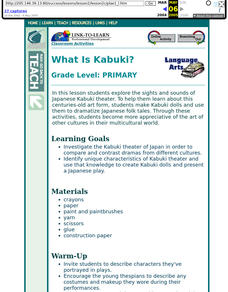Curated OER
Serach for the Lost Cave People
Learners examine primary source documents to draw inferences about 17th century American colonists.
Curated OER
Finding Buck Henry
Students read and demonstrate competence in the general skills and strategies of the writing process via the novel "Finding Buck Henry." They recognize complex elements of plot. Students analyze devices used to develop characters in...
Curated OER
Clay Boats
Seventh graders are given the opportunity to use model-building as a way to help comprehend the forces and phenomena at work in the world around them. They use both successful and unsuccessful models to make inferences, refine...
Curated OER
Dating Practices
Students interpolate, extrapolate, and make predictions from given information. They present results and conclusions from given data using basic statistics. Pupils create a survey from a critical question and decide which sampling...
Curated OER
Introduction to Science
Seventh graders investigate scientific methods to solve problems. They demonstrate creating data tables and graphs. They study the role of a scientist and the importance of safety in a science lab. They distinguish between an...
Curated OER
The Three Gorges Dam- Should it be Completed?
Students research and analyze the geographic problem of whether or not the Three Gorges Dam should be completed. Students take a position on the issue, gather information related to their position, present their conclusions, and write a...
Curated OER
Scientific Inquiry: Periodic Motion
Students construct their own pendulum. In this physics instructional activity, students design an experiment to find the factors affecting its period. They formulate a conclusion based on experimental data.
Curated OER
Clues to the Past
Students analyze how arhaeologists study the past. They define basic archaeological terms, make general inferences from observations, and explain the importance of context.
Curated OER
Nanaotechnology: Small Science, BIG DEAL!
Students read an article that introduces them to the science and applications of nanotechnology. They discuss the the everyday examples of how nanotechnology is and can be used. In small groups, they observe and make inferences about...
Curated OER
In Your Own Backyard
Young scholars observe organisms in their habitat and record their observations. They then draw conclusions about the organism's habitat needs and food sources.
Curated OER
Fish Communities in the Hudson
Students use tables of fish collection data to draw conclusions about where fish live in the Hudson Estuary. Given available data they interpret organized observations and measurements and recognize simple patterns, sequences, and...
Curated OER
Are You Thirsty: The Effects of Pollution on Drinking Water
Students discuss the different causes of water pollution. In this ecology lesson, students brainstorm ways to purify polluted water. They formulate their conclusion based on the results of the experiments.
Curated OER
Living in the Oak Woodlands: Early People of the Jewett Mine Area
Students examine the archeology and native peoples of the Jewett Mine area of Texas. Using a map, they explain the economic patterns of the native groups and how the geography of the area affected activities. They compare and contrast...
Curated OER
Science: Testing Water for Toxicity
Students investigate the potential toxicity of water samples using California blackworms to test water quality. They observe the worms' behaviors in different water samples and determine which sample has the highest toxicity. At the...
Curated OER
Social Reality Portrayed through Pictures: The City as a Social Laboratory
Twelfth graders analyze and research physical and cultural changes to the city of St. John. Viewing photographs in a virtual exhibit, 12th graders draw conclusions about the culture and societal norms in St. John through the years. ...
Curated OER
Magazine Madness
Learners look at pictures cut out of magazines to determine what is happening in the picture and predict what will happen next.
Curated OER
Classroom Conservation
Fourth graders suggest ways paper and other natural resources can be used and recycled in the classroom. Students conduct a investigation into paper use and make distinctions among observations, conclusions (inferences), and predictions.
Curated OER
Lone Stars and Gun Smoke
Seventh graders assess the significance of the Texas Ranger Frontier Battalion Company 'D' in maintaining law and order along the Texas-Mexico border. They study the importance of Ranger actions and utilize primary sources and maps to...
Curated OER
Foreshadowing and Prediction: W.W. Jacob's, "The Monkey's Paw"
W.W. Jacobs' story "The Monkey's Paw" provides plenty of foreshadowing which readers use to make predictions in this tightly composed, sound instructional plan. Your class reads the story, recording predictions and checking for veracity...
Curated OER
Learning the Roles in Literature Circles
I love literature circles! Get your pupils together and have them discuss the book they are reading. They determine and practice their role in the literature circle then discuss the book they are reading. This is a great introduction to...
Curated OER
Analyzing Literary Devices
Eighth graders identify figurative language and poetry in this literary analysis lesson. Using Through the Looking Glass by Lewis Carroll and a YouTube video for "The Walrus and the Carpenter," young readers complete a literary device...
Curated OER
Focus on Figurative Language
Using the poems "First Snow" by Ted Kooser and "Eating Alone" by Yi-Young Lee (or other suggested poems by Robert Frost or Sara Teasdale), middle schoolers search for examples of figurative language. Guide your learners by discussing...
Curated OER
Earth Egg
Students discuss plate tectonics and the layers of the earth's interior. They use eggs as models of the earth and answer questions regarding which part of the egg would represent which part of the earth.
Curated OER
Creating Context Mural
students examine the historical, political, religious and culture aspects of the Renaissance. Using this information, they read "Galileo" by Bertolt Brecht. They use the internet to research a specific event of the time period and come...




